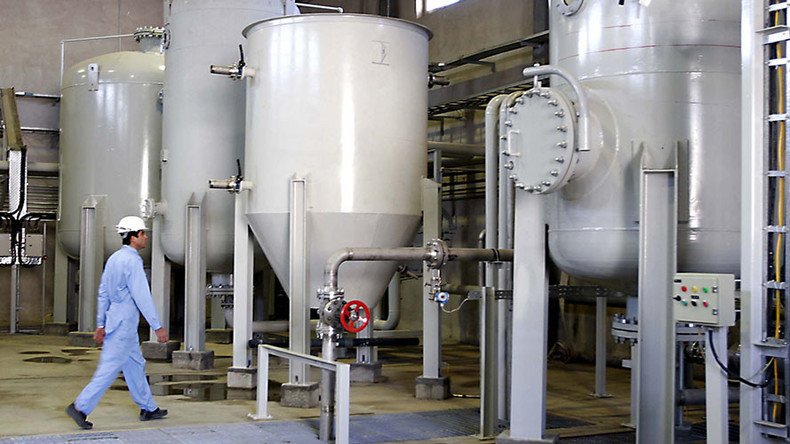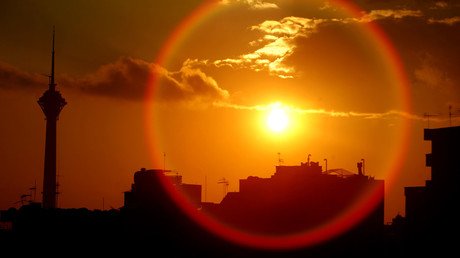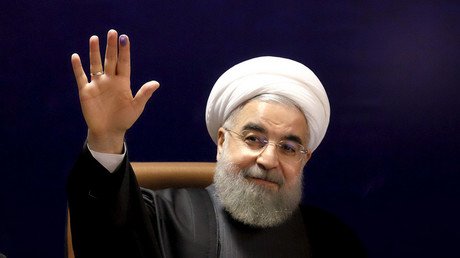Iran’s nuclear program heavy water to be sold to US for ‘critically important’ research

Over 30 metric tons of heavy water from Tehran's nuclear program will be delivered to an American company, US officials have announced. The move aims to protect the historic nuclear deal and stimulate other countries to buy the material from Tehran.
Formed with a hydrogen isotope, but not being radioactive, Iran's heavy water will be bought by the US Department of Energy (DOE) for $8.6 million, Reuters reported, citing the department spokesman. The shipment is expected to be delivered to the Oak Ridge National Laboratory in Tennessee by the Atomic Energy Organization of Iran in the coming weeks, according to The Wall Street Journal citing US officials.
Apart from the national lab, the purchased heavy water might be resold by the DOE to other American commercial and research buyers, Reuters reported. Initially being a component of making nuclear weapons and energy, heavy water can be used in the development of semiconductors and nuclear magnetic resonance imaging.
"Our purchase of the heavy water means that it will instead be used for critically important research and non-nuclear industrial requirements," State Department spokesman John Kirby said, while commenting on the deal.
The purchase is expected to pave the way for other international customers to buy the material from sanctions-relieved Tehran, US officials have said, while warning that Washington "will not be Iran's customer forever."
"That will be a statement to the world: ‘You want to buy heavy water from Iran, you can buy heavy water from Iran. It’s been done. Even the United States did it,'" US Energy Secretary Ernest Moniz said in an interview with The Wall Street Journal.
Further sales are being negotiated with another company that is not based in the US, Iran's top nuclear negotiator Abbas Araqchi, told reporters on Friday, having also confirmed the deal with Washington.
Iran needs to get rid of tons of heavy water following the nuclear deal reached between Tehran and six world powers in July of last year. Under the accord, the country must reduce its stock of the material by selling, diluting or disposing of it, and is permitted to keep only up to 130 tons at present. Once the rebuilt Arak nuclear research reactor is commissioned, the stock of heavy water must be further reduced to 90 tons maximum.
READ MORE: Khamenei says Iran still faces problems in international financial system, blames US
At the moment, the stockpile is at risk of rising above the limit, according to US officials. Meanwhile, the US annually imports around 75 tons of the material which is not produced domestically, largely purchasing it from Canada and other countries, The Wall Street Journal reported referring to the DOE officials.
The new deal with Tehran has been criticized by Republican lawmakers in the Congress. The House Majority Leader Kevin McCarthy said the purchase set a "dangerous precedent," while the chairman of the House Foreign Affairs Committee Ed Royce said it "goes well beyond what is required by the nuclear agreement," AP reported.
READ MORE: State Dept to Senate: Sanction Iran, but don't endanger nuclear deal
"Once again, the Obama administration is handing Iran's radical regime more cash," Royce said, adding that the purchase "encourages Iran to produce more heavy water to sell, with a stamp of US approval, on the international market."
After sanctions against Iran were lifted earlier this year in return for Tehran's complying with the deal to curb its nuclear ambitions, the Middle Eastern country has been slowly reemerging on international markets. Yet, Tehran has been criticizing some participants in the deal, saying that the accord has not yet brought the country sufficient economic benefits.
"It's essential that the other side, especially the United States, fulfill its commitments not on paper but in practice and removes the obstacles, especially in banking sector," Iran's Foreign Minister Mohammad Javad Zarif said last week following a meeting with EU's foreign policy chief, Federica Mogherini.














